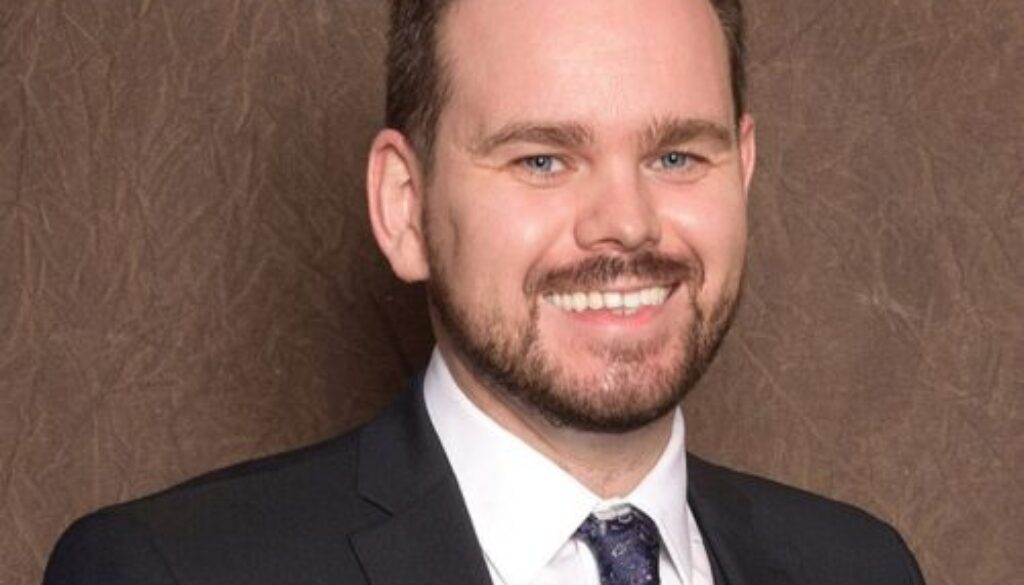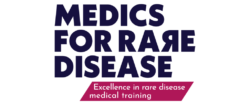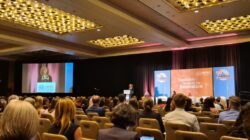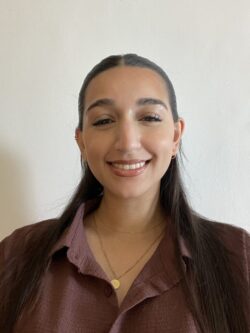The Unusual Suspects – A Masterclass In Rare Disease Communication by John Bassett
As a new clinical ambassador for M4RD, I eagerly anticipated the Unusual Suspects conference in London this year, and it certainly didn’t disappoint! Traveling from Chester donning my stripy socks, I arrived just in time to meet the M4RD team in person before the event kicked off. Dr. Shwetha Ramachandrappa, President of the Medical Genetics section of the RSM, opened the event, followed by Lucy McKay’s excellent overview of Medics for Rare Diseases mission and the fantastic Rare 101 presentation, which if you haven’t already watched, I would strongly recommend having a look at on this very website!
The talks – the impact of communication on patient experience
Jono Lancaster, author of “Not All Heroes Wear Capes” and co-founder of the “Love Me, Love My Face” foundation, spoke next. Having Treacher-Collins syndrome, he discussed the negative and positive impacts of language from healthcare professionals and from wider society can have on an individual with a rare condition. He started by quoting things that had been said about him both as a child, and online more recently, which was both shocking and sad and made me feel viscerally upset on his behalf. He went on to explain how he had managed to overcome this rejection and abuse, thanks to the support of his adoptive mother and his own inner strength and inner voice. This brilliantly demonstrated the power of words and I found his talk extremely powerful and moving.
Dr Lisa Kauffman, a Consultant Community Paediatrician/Associate Medical Director of Children’s Community Services Manchester/Communication skills trainer, followed with a presentation on core communication skills. She imparted invaluable tips about how to make consultations patient-centred by asking the simple question of “what’s important to you today”? As healthcare professionals we often have our own agenda and have blinkers on to what’s important to the patient. Dr Kauffman’s presentation made me reflect that although we have our agenda and there is always time pressure, if we don’t address what’s important to the patient we are never going to be able to truly give them the care they deserve, and we actually waste time because what was weighing most heavily on their mind was left to the very end or not addressed at all. I have put some of these tips in to practice already and found that I have already seen the benefits and seem to run on time more in clinic too!
Kerry Leeson-Beevers, CEO of Alstrom Syndrome UK, discussed her experiences as a mother of a person with a rare disease and the inspiring and exciting Breaking Down Barriers project – a patient organisation and support group network that share experience and develop best practice to support families at increased risk of having children with genetic conditions but who are unlikely or unable to access mainstream services. They examine what the barriers are for families engaging with healthcare services and try to find strategies to address these. This highlighted the intersectionality of rare disease and other characteristics of patients. As a clinician it is vital to have an awareness of this to avoid barriers or alienation of patients or their families, that could prevent them accessing the care they need.
Leisha Devisetti travelled all the way from Berkeley, California to tell the poignant and heart-breaking story of her mother’s diagnostic odyssey whilst battling ameloblastic carcinoma which won the Student Voice Prize. She highlighted how rare disease is challenging for both patients and physicians due to uncertainty from lack of physician training in rare conditions as well as the lack of literature. This creates communication barriers because the culture in medicine links uncertainty to failure. Poor communication, use of jargon and hasty definitive diagnosis are used to cover up this lack of certainty, which ultimately results in patient harm and delays accurate diagnosis which was movingly illustrated by Leisha’s story.
The final presentation by Kevin Ward (Area Teams Manager, Healthcare Improvement Scotland) discussed the “What Matters To You?” campaign, emphasizing the shift in healthcare conversations to focus on patients’ priorities. This tied together the importance of patient-centred communication discussed throughout the day. It was also encouraging to see that these principles are being across a national healthcare system with real world observed benefits, as seen from the numerous case studies on the “What Matters To You?” website.
The final section of the day was a panel discussion made up of Aisha Seedat (M4RD Patient Ambassador/Rare Disease Advocate), Saffiya Seedat (Student, University of Leicester), Hope Russell-Winter (M4RD Patient Ambassador) and Jono Lancaster. I found this section of the day particularly insightful because we heard what mattered most to the panellists, all with lived experience of rare disease. The resounding answer was good communication and taking the time to really understand them and their condition without making assumptions. Healthcare professionals making assumptions about a person’s ability, religion, culture, reproductive choices, ambitions and desires had all been experienced by the panellists.
Take away messages
The overarching theme that I took away was how vital good communication is for our patients, particularly in rare disease. I feel these talks have already had a profound effect on my clinical practice – as Dr Lisa Kauffman put it about herself “I thought I was quite a good communicator”, but the things I have seen and heard today have made me reflect on my communication in my clinical practice and have made me consider how well am I really listening to my patients? The other theme was the intersectionality of rare disease and other factors such as gender, religion and socioeconomic status. People with rare diseases may face discrimination or assumptions due to their condition, as sadly highlighted today, but this is often compounded by healthcare not being accessible or responsive to the needs of communities affected by rare disease and so patients miss out on healthcare because of structural and institutional barriers.
How these barriers are being addressed was demonstrated beautifully by Kerry Leeson-Beevers presentation and today really highlighted how important patient advocacy groups are and equally asking patients what it is that they would like to talk about in identifying where and what these barriers are.
Overall, The Unusual Suspects proved to be a fascinating, fun and enriching day. It provided an opportunity to connect with the rest of the M4RD team, and the lessons learned about communication will undoubtedly shape the way I interact with patients throughout my career. I believe any clinician, whether working in rare diseases or not, would benefit from the valuable insights shared during this conference.




